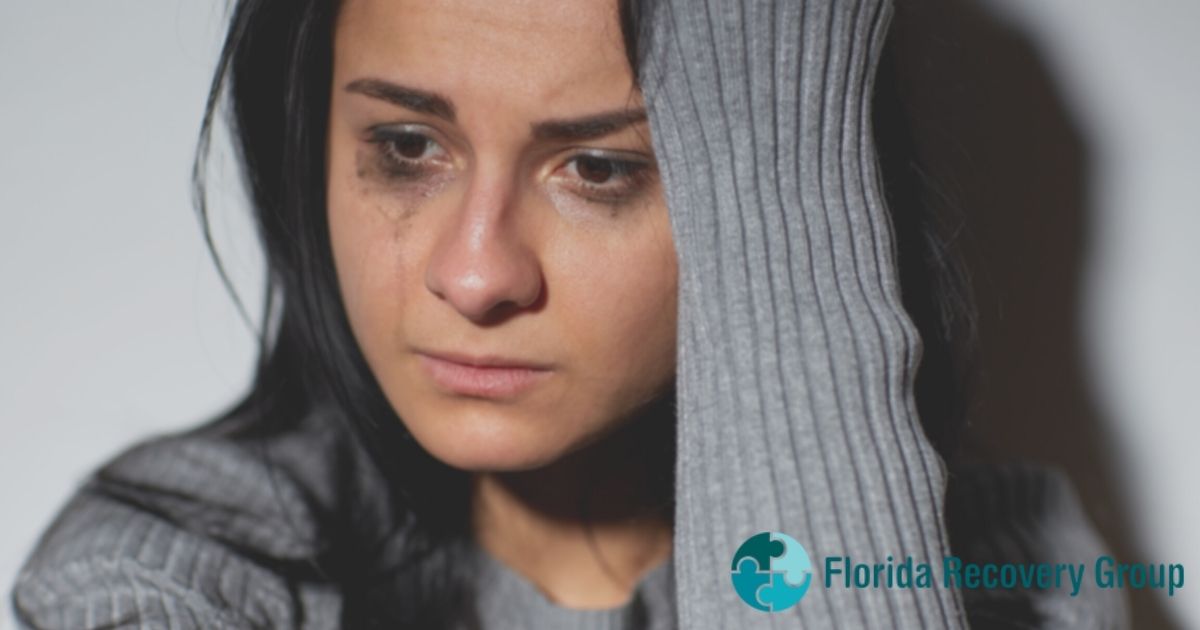
23 Nov The Connection Between Grief, Loss, and Addiction
Experiencing loss is one of the most common forms of trauma to date. Unfortunately, everyone will experience loss and grief at some point in their lives. Whether it be the sudden death of a loved one or losing someone significant in your life, experiencing loss can cause an array of emotional and mental distress. In fact, experiencing loss and grief increases the risk of individuals developing addictive behaviors and unhealthy habits.
The pain and heartache caused by grief and loss often correlate with the development of a substance use disorder. However, this is more than preventable. If you or a loved one are dealing with the effects of loss or death, it’s important to become educated on the connection between grief, loss, and addiction. This allows individuals to prepare for the ways that grief and loss negatively impact their ability to cope with unsavory emotions.
Let’s take a look at the connection between grief, loss, and addiction, as well as how individuals can recover.
The Brain and Grief
According to studies, grief is not just something that occurs in your mind. It also affects your body. To begin, grief is known to affect the human limbic system by disrupting an individual’s brain chemicals, such as dopamine and serotonin.[1] These chemicals are directly responsible for mood, happiness, and emotional stress regulation. By no coincidence, alcohol and drugs affect the same brain chemicals.
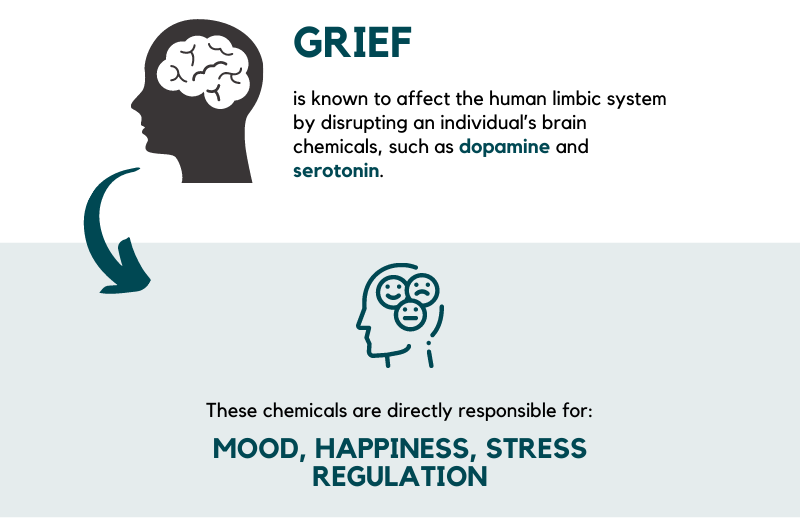
The Journal of Behavioral Medicine conducted a study on the health outcomes associated with grieving a loved one. According to this study, years of mourning a loved one tends to cause several negative health repercussions. One of the repercussions found included a decline in sleep quality, as well as an increase in alcohol consumption following years of untreated grief.[2] This comes as no surprise, as grief commonly causes depression, which is linked to alcohol abuse.
Because the brain and the body both feel loss and grief, as well as physical pain and biological complications, it’s no wonder that grief and loss can lead to addiction.
What Happens When Individuals Are Unable to Cope?
Life is complicated, especially when you lose someone you care for. If an individual never gained the coping mechanisms necessary to properly cope with grief and loss, they may have a more difficult time dealing with a loss when compared to their peers.
When someone cannot cope with the death of a friend or loved one, they may turn to external forms of coping to soothe their pain. Oftentimes, people resort to abusing substances to cope with the effects of grief.
While there is never a “correct” way to cope with a loss, abusing drugs and alcohol may worsen grief and prolong an individual’s healing process. On the other hand, utilizing proper coping mechanisms does the opposite. When an individual uses healthy coping mechanisms, they tend to avoid any dysfunctional adaptations of grief while healing wholly.
The Symptoms of Grief and Loss
Individuals experiencing grief will likely experience a myriad of emotions and symptoms. With that being said, grief is never the same for any individual. However, there are common symptoms of grief to look out for.
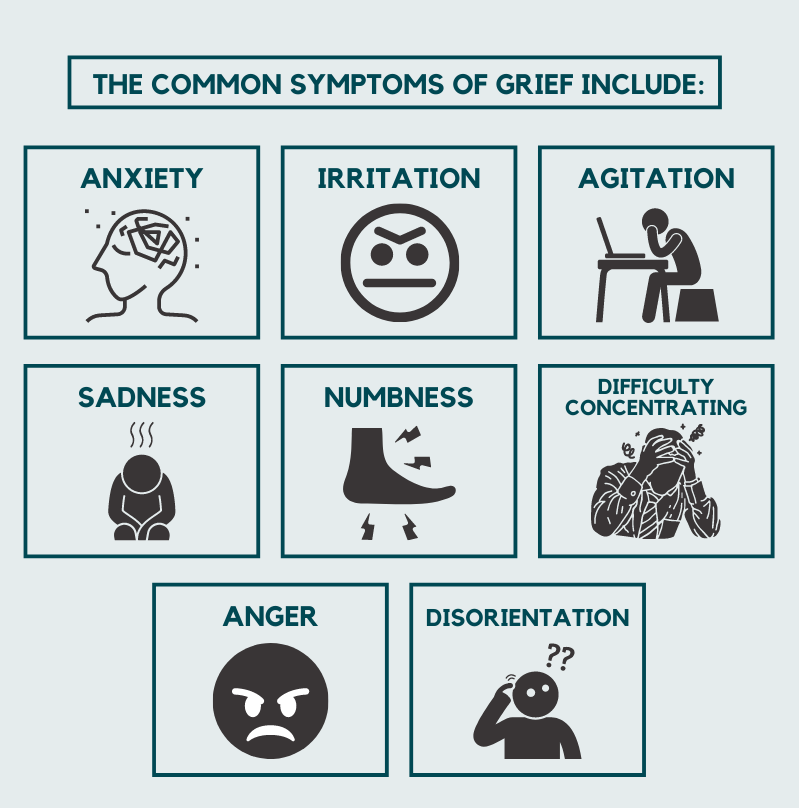
Unfortunately, these symptoms, when left untreated, may lead to or increase the physical consequences of grief. Some examples of the physical consequences of grief include trouble sleeping, tiredness, or an overall disruption in eating patterns. Each side effect of grief is a natural reaction to losing someone you love or experiencing a great amount of distress. However, if left untreated, the cycle of grief, loss, and addiction may begin.
The Grieving Process: Explained
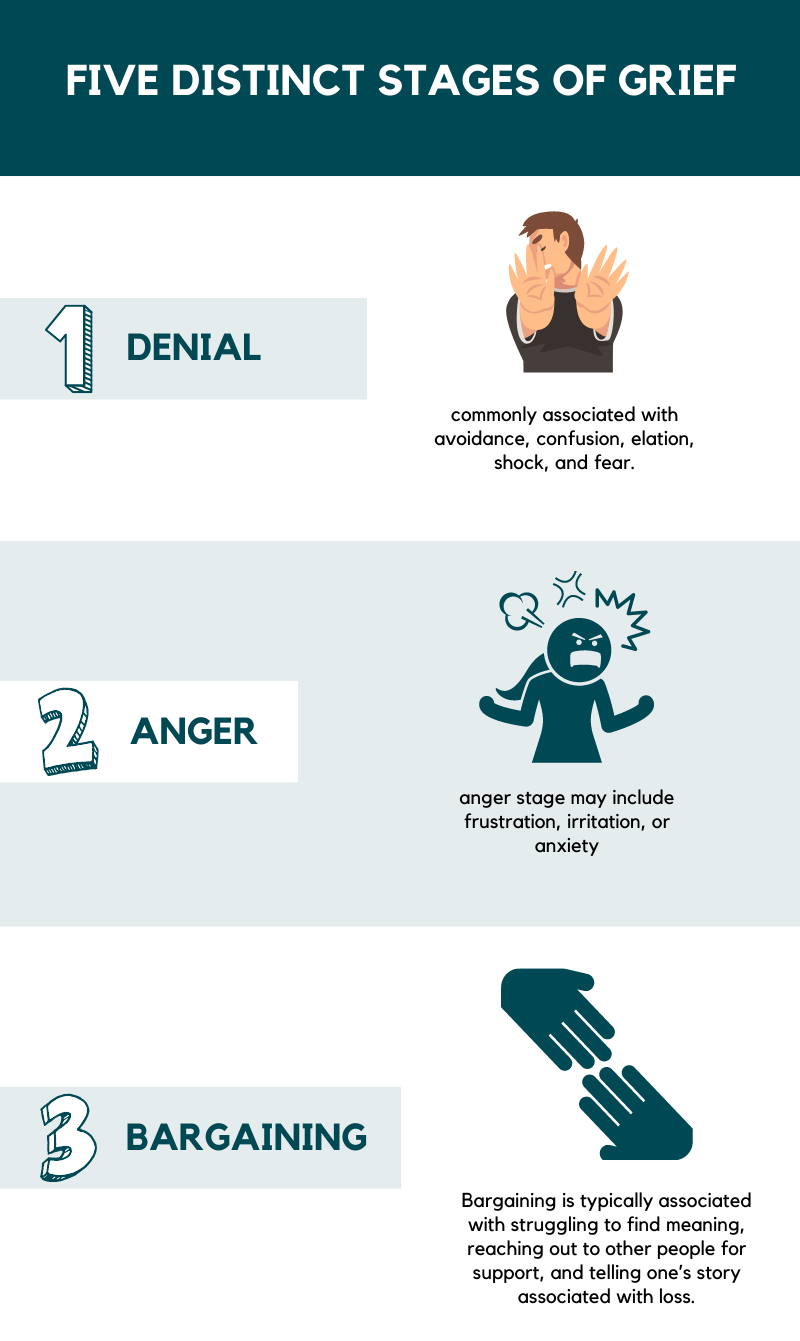
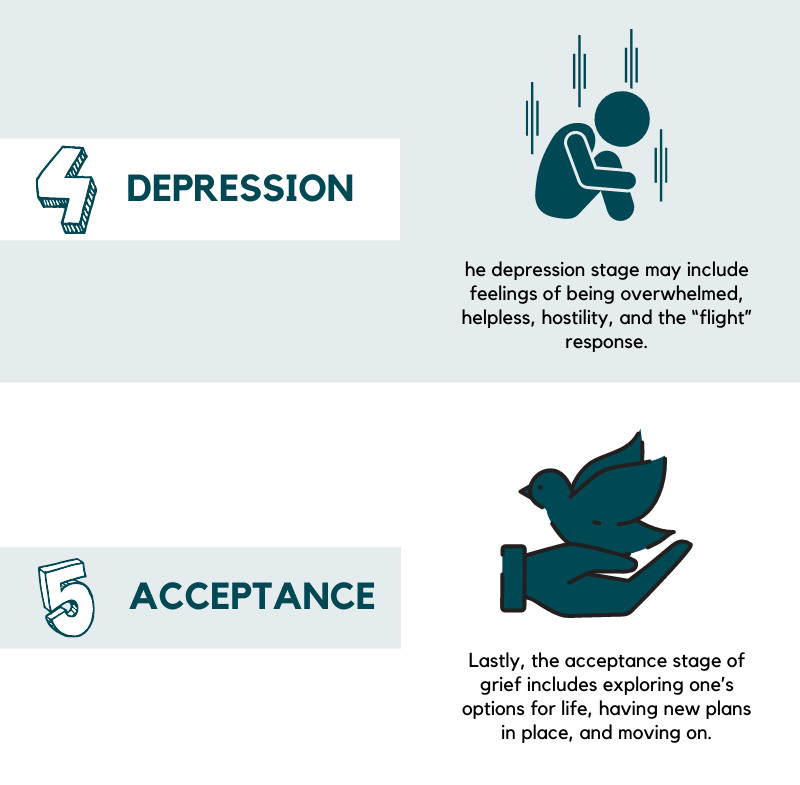
According to the Kubler-Ross model of grief and loss, there are five distinct stages of grief that an individual can expect to go through after losing a loved one.
These stages include:[3]
1. Denial
2. Anger
3. Bargaining
4. Depression
5. Acceptance
Each stage may include a few emotions. Denial is commonly associated with avoidance, confusion, elation, shock, and fear. Next, the anger stage may include frustration, irritation, or anxiety. Bargaining is typically associated with struggling to find meaning, reaching out to other people for support, and telling one’s story associated with loss. The depression stage may include feelings of being overwhelmed, helpless, hostility, and the “flight” response. Lastly, the acceptance stage of grief includes exploring one’s options for life, having new plans in place, and moving on.
It’s important to note that individuals do not always experience these stages in chronological order, and some individuals may skip certain stages altogether. It may take months or even years to feel normal again, but grief and loss are experiences that people recover from daily.
Losing a Loved One in Recovery
Many individuals who are recovering from substance use disorders, such as drug addiction or alcoholism, experience the death of a loved one while in recovery. Unfortunately, death and the pain that follows often makes many individuals question their sobriety. This may prompt the return of an urge to abuse substances and cause an individual to fall victim to the cycle of addiction once again.
Individuals in recovery from addiction who lose a loved one should develop a healthy relationship with a higher power, reach out to a strong and supportive network of peers, and attend professional therapy for grief. In doing so, people in recovery will ensure that their grief will not turn into a relapse, thus breaking the cycle of loss, grief, and addiction.
How to Find Help for Grief, Loss, and Addiction
If you or a loved one are in recovery and have recently experienced a loss, please seek professional help. Attending therapy and support groups while building healthy coping mechanisms is the best way to prevent a relapse stemming from unresolved grief.
However, if you have relapsed as a result of your grief or loss, you should always seek professional addiction treatment. There is no shame in needing a little extra help, especially during a time of grief and loss. If you or a loved one are in need of inpatient addiction treatment, contact us today.
References:
1. https://pubmed.ncbi.nlm.nih.gov/24923337/
2. https://www.ncbi.nlm.nih.gov/pmc/articles/PMC4197803/
3. https://pubmed.ncbi.nlm.nih.gov/30439302/





